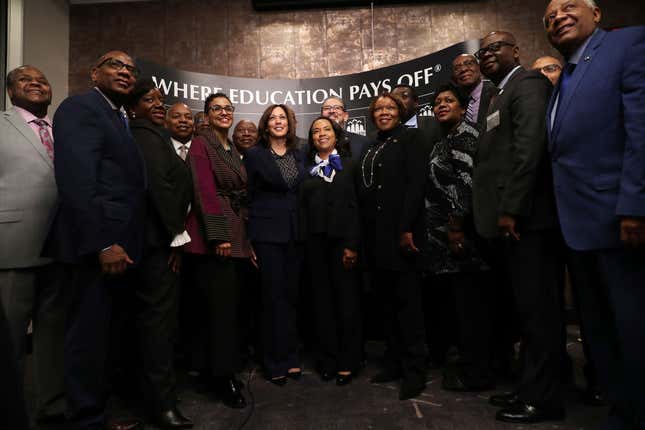
Ever since eight HBCUs received bomb threats on Jan. 4th, Black leaders have been hoping the FBI and the Biden administration would find and punish those responsible. As we speak, more than a third of Black colleges have received calls comprised of racial slurs and threats.
Even though the administration launched an investigation in conjunction with the FBI after 18 schools were targeted in February, many officials and students feel forgotten. Politico notes that six months later, there has been radio silence. No arrests, no motives announced, or suspects named, and HBCU presidents are frustrated with the lack of urgency.
“I’m beyond frustrated,” said Carmen Walters, president of Tougaloo College in Mississippi, at a gathering of HBCU presidents at Charlie Palmer Steakhouse in D.C. in August. “I’m very angry that no one has been brought to justice, but there’s been no conversation about the investigation at all.”
A collection of advocacy groups got together to push the Biden administration to make funds available to enhance public safety. Even though no bombs were found, the president of Claflin University in South Carolina, Dwaun Warmack, said the threats negatively impacted students who felt the campus was a “safe haven to them.”
The Biden administration opened an application process for schools to receive grants to support students’ mental health and campus security in the wake of these threats. Southern University Law Center in Louisiana has been the only HBCU that received a grant – seven months after the school received the threat. While there is a need to help with the mental health toll the students and families have experienced, the schools have also been hurt financially due to lockdowns and evacuations.
“Why do we have to apply for a grant when you know I had a bomb threat? You know I had all these expenses,” Walters said. “You’re telling me, ‘OK, you need to reinforce your buildings. You need to get a new sound system, get a new alarm system, do all these things’ — and there are no dollars to do that.”
“I think it’s a complete joke,” she said. “I think the grant process was just a way to say, ‘OK, here’s a bone. Stop crying. Stop complaining.’”
Even though the bomb threats have stopped for now, FBI executive assistant director of intelligence Ryan T. Young told the House Oversight Committee that other forms of threats such as graffiti and cyber attacks are still ongoing.
“I’ve heard the serious nature of the threats. I’ve heard the students, faculty, staff, administrators called out by their name, derogatory terminology,” Murray said.
It’s hard to imagine that the response wouldn’t have been different if the schools in question were predominantly white. As for Walters, she agrees 100%, as noted by Politico.
“Look, I went to a white school,” Walters of Tougaloo replied. “I can promise you, baby; it would’ve been different.”

